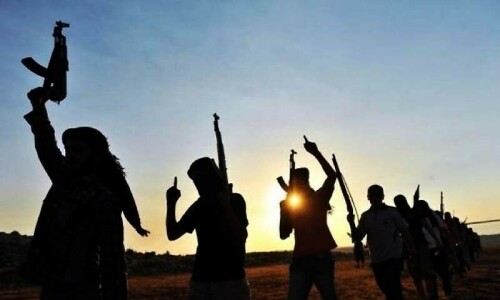EARLIER this week, a report in this newspaper detailed a recent notification issued by the Higher Education Commission to all varsities in the country proscribing any activity that runs counter to the “ideology and principles of Pakistan, and/or perspective of the government of Pakistan”. According to insiders, similar directives have been issued at the college level too.
There is, as such, nothing particularly novel about such steps. State and government functionaries of various stripes have never been shy of suppressing ideas and political actions considered insurrectionary. While invocation of the so-called ‘ideology of Pakistan’ became commonplace during the Zia regime, nationalist edicts have been present throughout our history.
What triggered this most recent assertion of state ideology is immaterial. What those issuing the shut-up calls should remember is that the world — Pakistan included — is increasingly characterised by a limitless flow of information. Force-feeding every young person in an educational institution the ‘ideology of Pakistan’ is thus untenable.
Critical young minds look beyond the ‘ideology of Pakistan’.
According to the HEC itself, the establishment of digital libraries is one of its most important achievements. By definition then, students can access books and articles from all over the world; is there any way of ensuring that they read about history, politics, culture and economics only through the lens of the ‘ideology of Pakistan’?
Young people with critical minds always seek out alternative interpretations of events otherwise depicted in singular terms by the state. This has been the case even during the most repressive periods of our history. Now that the floodgates of alternative sources of information have been opened by the internet, the opportunities for restive young minds to explore the unknown have increased exponentially.
Presumably those who make such policies think that banning YouTube ensures that all unwarranted ideas, and images, currently doing the rounds on the internet can be kept out of the land of the pure. Or maybe there is a more significant contradiction unfolding in Pakistani society to which they would rather not draw attention.
The truth is that the spread of the internet, cable television and smart phones — ie cutting-edge capitalist technology — engenders substantive cultural and political change, and not just economic change as is conventionally assumed. Banning YouTube, or issuing redundant notifications about the immutability of the ‘ideology of Pakistan’ are attempts to selectively access the ‘benefits’ of technology whilst shielding oneself from the ‘costs’. Needless to say, these attempts are ultimately futile.
I have many reservations about the new information technologies, and how they will affect the development of human society. But what I cannot deny is that these technologies imply social transformation of a qualitatively new kind. We do ourselves no favours at all by continuing to live in a world of make-believe in which defence of the ‘ideology of Pakistan’ is the end of all intellectual and political life.
Having said this, one cannot lose sight of the fact that the vast majority of social science and humanities students at the college and university level have from a very young age imbibed a culture of rote learning in which concoctions such as the ‘two-nation theory’ — the obvious precursor to the ‘ideology of Pakistan’ — form the basis for all thinking about the social world.
This at least partially explains why they do not blink when they sign affidavits upon enrolling in higher educational institutions committing themselves to refraining from political activities throughout their tenure as students. And also why there is never any great reaction on campuses to directives such as the one recently issued by the HEC.
That is to say that the rot sets in much earlier than at the tertiary level. I suspect that, notwithstanding the so-called digital divide, the new information technologies will have significant impacts on the socialisation process of all young people in this country, even if over a fairly prolonged period. Both for children who go to school and for those who don’t, and regardless of how meaningful an education those who go to school receive, something has got to give.
Our formal state apparatus — including the HEC which is amongst the newest of state institutions — is still caught in a dialectic of order and change that has defined its interventions in social life since the colonial period. On the one hand the state depicts itself as the vanguard of progress and seeks to secure the fruits of modernity; on the other it propagates the imperative of a strict social order – on the basis of an immutable ‘ideology of Pakistan’.
Historians who are not chained to the dictates of this ideology can testify that all social orders wither away in the face of winds of change. One day, this one will too.
The writer teaches at Quaid-i-Azam University, Islamabad.
Published in Dawn, November 14th, 2014













































